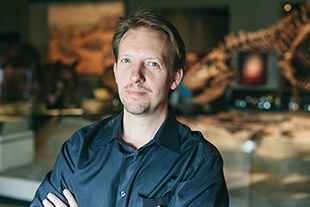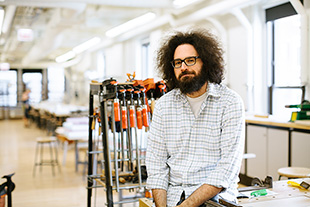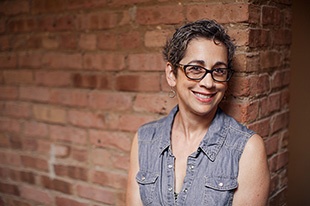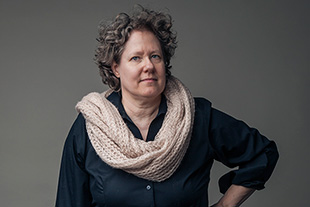Darrell Jones
Theatre and Dance
Faculty member Darrell Jones talks dance and upcoming projects.
Darrell Jones has studied dance in the likeliest and the unlikeliest of places—from Florida State University’s graduate dance program to dance clubs like TRAXX, Loretta’s, Capers, and Queen, and even his garage. He first became interested in dance at family reunions and fell into the professional world of dance by mistakenly taking a social dance course his first year of college. He now teaches improvisation, composition, and contemporary dance techniques at Columbia College Chicago. In 2019, Jones received a prestigious $40,000 Grants to Artists award from the Foundation for Contemporary Arts, which accepts nominations from distinguished artists and arts professionals. Jones tells us about studying and teaching dance and about the work of his late father, Dr. William R. Jones.
When did you start teaching at Columbia College?
I started teaching at Columbia 15 years ago. I was here as part of the Dance Presenting Series and formulated relationships with the Dance Department and the students. Teaching has always been the most challenging aspect of my career. It is the thing that I have to work hardest at. It is relational and in the moment. It truly encompasses all the skill sets that I employ as a performer.
Can you tell us about your experience as a Foundation for Contemporary Arts grant recipient?
I was honored to receive the grant for 2019. The mission of the Foundation for Contemporary Arts (FCA) is to encourage, sponsor, and promote innovative work in the arts created and presented by individuals, groups, and organizations. It was a nomination process where I didn’t know that I was actually in the running to receive the grant. When they called me on my office phone, I thought it was a telemarketer. I was incredibly honored to know not only that I was nominated but that my grant materials had been assembled by artists and organizations unbeknownst to me. I’ve often emphasized my role as a movement researcher over choreographer and so the surprise phone call from FCA was an affirmation to deepen the life research projects that I am already involved in and know that my support systems are within arm’s reach.
Can you tell us about any current projects you are working on?
I plan to use a large chunk of the FCA’s grant for an archiving project around the work of my late father, Dr. William R. Jones, who was an internationally recognized and celebrated activist, scholar, philosopher, theologian, and educator. My father dedicated his long career to the analysis and methods of oppression and to working with others in their anti-oppression initiatives. A fundamental part of his work was the exploration of religious humanism and liberation theology. My father passed away in 2012. This was an important time for me in organizing his personal effects and allowing for deep reflection and organization of both his materials and my own. The last frontier has been his office space which houses an extensive archive encompassing authored books and articles, a large selection of research books, taped lectures, and 35 years of teaching materials around mechanisms of oppression and the intersectionality of race, gender and class.
During the upcoming year, I will be organizing these intellectual materials including the foundational work of sorting, cataloging, and digitizing his collections—books, handouts, audio tapes, videos, and found objects. An open source platform was something he was passionate about before his death and this catalog would be a repository of his unique research and serve as a think tank for former students and colleagues to continue the conversation, advance the theoretical framework, and apply it to problems in real-world settings. I have a personal interest in cataloging his materials to use as a creative tool with applications in movement research and as a model in archival processes. I am currently involved in several gatherings around ‘living’ archives with Jawole Willa Jo Zollar (Urban Bush Women) and Bebe Miller (Bebe Miller Dance Company). The process of archiving my father’s work with my own creative applications would be concurrent with these conversations around choreographic archival materials.
What advice do you have for students who are not sure about whether or not they should major in Dance or advice for anyone who would like to pursue Dance?
As I have gotten older, I’ve seen some of the colleagues that I have danced with go on to serve as deans and provosts of major academic institutions, become doctors, parents, etc. I think more than ever about the transferable skills as part of our profession and the importance of devoting your time to something that you believe in.
Jones has performed in the United States and abroad and has collaborated on dance films, documentaries, and interactive multimedia installations with numerous choreographers and dance companies. His artistic research has centered on a conversation between his postmodern training and the voguing aesthetic. Jones explores how individuals accumulate identity and mirror culture through movement.










